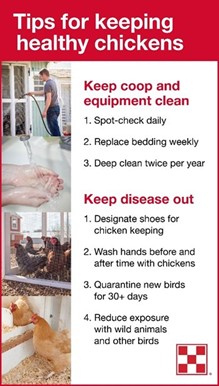
How to Prevent Chicken Diseases
Flock Management : Flock Health
Healthy birds are happy birds. How do you prevent chicken diseases and chicken parasites to keep your chickens healthy?
To prevent chicken diseases, chicken parasites and to help keep backyard chickens healthy, focus on good sanitation and biosecurity.
Biosecurity is another word for health and sanitation. As backyard chicken keepers, be sure to take biosecurity very seriously. The main goals of biosecurity are to help reduce chicken disease transmission and to protect birds from becoming ill from chicken parasites and other external factors.
The first step to a healthy flock is regular sanitation. It’s very important to keep the chicken coop and chicken equipment clean.
 How to keep your chickens healthy
How to keep your chickens healthy
Clean chickens are healthy chicken. Learn how to clean a chicken coop, how often to clean a chicken coop, how to clean a chicken waterer and more.
How to clean a chicken waterer and feeder:
- Choose a disinfectant that is safe for animals and doesn’t leave a residual film. A mixture of 10 percent bleach and 90 percent water can work well.
- Disinfect all equipment and materials prior to first use and weekly thereafter.
- Rinse thoroughly.
- Keep disinfectants handy so you can clean chicken waterers, chicken feeders and roosts weekly.
How to clean a chicken coop:
- Regular coop cleaning is essential to keep your chickens healthy. Damp litter creates conditions that are perfect for parasites, viruses and bacteria to thrive. Cleaning the chicken coop can be a quick process if done regularly. Perform daily spot checks, weekly bedding replacement and deep cleaning at least twice a year.Start by adding absorbent wood shavings to the floor of the coop and nest boxes, 3 to 4 inches deep to keep the area dry and odor free.
- Remove wet or soiled bedding daily.
- Weekly, remove and replace all bedding.
- At least twice a year, perform a deep clean by removing everything from the coop and sanitizing with a 90/10 solution of water and bleach.
Other tips for keeping healthy chickens
- Whenever working with backyard chickens or supplies, wash your hands with soap and water before and after handling birds and eggs.
- Minimize the amount of exposure to external sources of contaminants both human and animal. This means reducing the flock’s exposure to visitors who may own poultry; if you or a visitor has been with another flock, be sure to change your clothes and shoes to prevent carry of disease. A great way to do this is by designating a pair of shoes or boots to be worn only when you are spending time with your flock.
- Avoid wildlife and domestic pets by keeping food in safe areas, such as inside the coop or runs. Reduce contact with wild birds or their droppings by placing wild bird feeders far away from the coop and by constructing a roof or cover over the run.
- When adding new birds, follow a 30-day quarantine. Keep any new birds cooped in a different building at least 12 yards away from your flock, observe them for signs of illness and care for new birds last to help keep from spreading disease.
Chicken biosecurity tips from USDA
Our friends at the U.S. Department of Agriculture (USDA) have similar biosecurity tips for preventing chicken diseases. Following are general guidelines for maintaining a healthy flock and sanitary coop from USDA’s Biosecurity for Birds:
- Keep your distance: Restrict access to your property and your birds. If visitors have birds of their own, do not let them near your birds. Your birds should not have contact with wild birds and migratory waterfowl because they can carry germs and diseases. As an example, make sure there is a roof over your runs.
- Keep it clean: Wash your hands thoroughly before and after working with your birds. Wear clean clothes and scrub your shoes with disinfectant before tending your birds. Clean and disinfect equipment, including cages and tools that come in contact with your birds or their droppings. Remove manure before disinfecting equipment. Properly dispose of dead birds.
- Don’t haul chicken diseases home: Buy birds from reputable sources. Quarantine new birds or birds returning to the flock for at least 30 days. The quarantine area needs to be in a separate building and as far away from your coop as possible. Nothing from the quarantined area should come in contact with your coop and the rest of the flock. If your birds have been to a fair or exhibition, keep them separated from your flock for 30 days after the event and follow the quarantine recommendations mentioned.
- Don’t borrow chicken diseases from your neighbors: Do not share garden equipment or poultry supplies with your neighbors or other bird owners. If you do bring these items home, clean and disinfect them before they reach your property.
- Know the warning signs of chicken diseases: Early detection can help prevent the spread of disease. Symptoms of chicken diseases may include: decreased feed consumption, huddling, depression, closed eyes, respiratory signs (such as coughing and sneezing), watery greenish diarrhea, excessive thirst or swollen wattles and combs.
As you get to know your flock, you should be able to tell when behavior is out the ordinary. Be observant of your flock. Look for birds with their feathers fluffed out from their body. Understand the personalities and mannerisms of your birds so that you will notice a change when something isn’t right. If you notice any signs of illness, contact your local veterinarian. The earlier you can detect a problem, the easier it is to resolve.
Keep your birds healthy with a complete feed – take the Purina Feed Greatness® Challenge.*
And, for more tips on biosecurity and sanitation, visit this link on the USDA Biosecurity for Birds website.
*The Feed Greatness® Challenge is a 60-day feeding trial where you will feed Purina® feed, monitor your flock's performance and health, take pictures and receive emails with helpful information.



